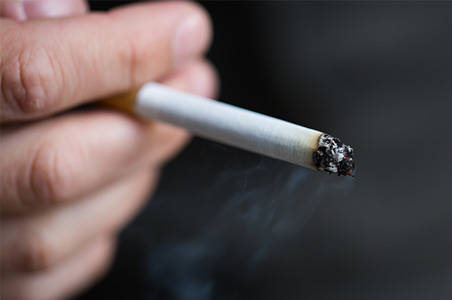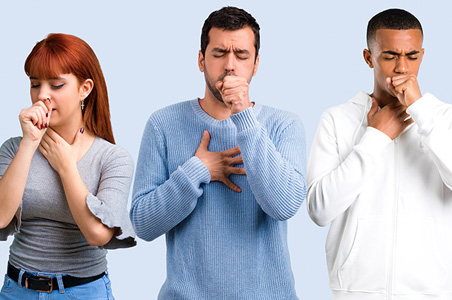Lung Cancer
What is Cancer?
The body is made up from millions of cells that are constantly dying and being replaced. Normally, cells divide in an orderly and controlled way. Cancer occurs when a cell divides and multiplies too rapidly. This produces a lump of abnormal cells known as a tumour. Tumours are either benign (non-cancerous) or malignant (cancerous). There are 200 different types of cancer and early detection can greatly increase the chances for successful treatment.
Lung Cancer is one of the most common cancers and is the leading cause for cancer related deaths. Every year in Northern Ireland over 1,000 people are diagnosed with lung cancer. 9 out of 10 cases are caused by smoking.
What is Lung Cancer
Risk factors
You may be more at risk of developing lung cancer if you:
- Smoke
- Have a family history of lung cancer (if so, contact your GP)
- Are exposed to chemicals that can cause lung cancer (such as asbestos)
- Are exposed to second-hand smoke
- Have had a previous smoking related cancer or lung disease

Risk factors
What to look out for
The symptoms of lung cancer include:
- A persistent cough
- Shortness of breath
- Coughing up phlegm (sputum) with traces of blood
- Persistent chest pain
- Loss of appetite
- Tiredness (fatigue)
- Unexplained weight loss
Seek advice from your GP if you have any of the above symptoms.

What to look out for
Reduce Your Risk
The greatest cause of lung cancer is smoking.
The more cigarettes you smoke, the greater your risk of developing lung cancer. The longer you smoke will further increase your risk. The good news is that as soon as you stop smoking your risk starts to decrease. So, no matter how long you have been smoking it is still worth quitting!

Reduce Your Risk
Preparing to Stop
There are many obstacles that smokers believe are in their way before they can successfully break the habit. We can help you get past these:
- It’s too late to stop. The damage has been done. The sooner you stop smoking the better as the damage that is caused by smoking can be undone if you quit the habit.
- Stopping smoking puts on weight. Weight gain can be avoided by adopting an active lifestyle and eating a well-balanced diet.
- Smoking helps reduce stress. Nicotine is actually a stimulant and so does not reduce stress. The feeling of becoming less stressed is actually achieved by feeding your nicotine craving.
- I don’t have the will power.
There’s lots of support out there to help people stop smoking. You don’t have to do it alone.
Reduce Your Risk
Get Help to Quit
Stopping smoking has the biggest impact on reducing your risk of lung cancer. For advice and support or to find your local stop smoking service visit the Public Health Agency’s Stop Smoking website (www.stopsmokingni.info). The website also offers the opportunity to order a ‘Quit Kit’ free of charge, which contains information and useful tips to stop smoking.
There are other ways of reducing our risk of lung cancer which includes –
- Diet – eat plenty of fruit and vegetables
- Physical Activity – maintain a good level of physical activity to reduce your risk of lung cancer by over 20%. More vigorous activities have a greater impact on reducing your risk.
Although these lifestyle factors help prevent lung cancer in non-smokers, if you are a smoker they may have less impact on reducing your risk. The best thing by far is to quit smoking.
Get help to quit
Action Cancer provides…
Early Detection
Breast screening services and health checks available from the Big Bus and Action Cancer House in Belfast.
Support Services
Complementary therapy, acupuncture, counselling, life coaching, peer mentoring; and our Positive Living Programmes are available for those impacted by cancer in order to enhance quality of life and learn coping strategies.
Education
As a local charity with a focus on cancer awareness, prevention and detection the health promotion team deliver a range of services and programmes to schools, communities and workplaces across Northern Ireland.
